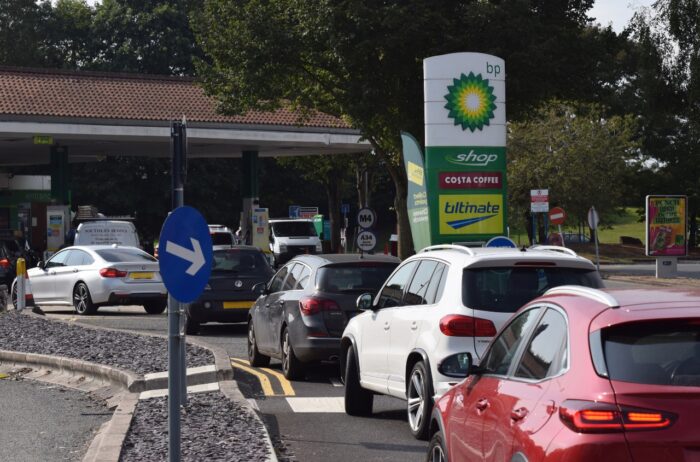Top Class Actions’s website and social media posts use affiliate links. If you make a purchase using such links, we may receive a commission, but it will not result in any additional charges to you. Please review our Affiliate Link Disclosure for more information.

London mom Elizabeth Blackman has been keeping a close eye on the news — she has to.
In the last month, as the United Kingdom has been hit with twin energy crises that have seen gas prices soaring and petrol in short supply, consumers have been left to make tough decisions about their usage, especially as the nation heads into winter.
“Every petrol station within our borough has been out of petrol for the last few weeks and we have avoided using our car to save the half tank we have,” Blackman told Top Class Actions. She lives in Southwark with her husband Charlie and baby Alexia, but they are getting set to move out when it gets cold.
“We are planning on staying with family over the winter as we are concerned about the rising energy prices. We’ll be turning our gas off. We are yet to see the total impact,” she said.
The Blackmans are just one of millions of UK consumers grappling with an unprecedented energy crisis that’s forcing them to redraw their plans and budgets ahead of the holiday season. Meanwhile, more than a dozen businesses have already shuttered as shortages and price spikes prove too much to sustain.
The Petrol Shortage
Despite the petrol and gas shortages both combining to hit consumers and small businesses in the pocket, the causes of the crises are not related.
The reason petrol stations have run dry — spurring a spate of panic buying, and causing families like the Blackmans to leave their cars at home — is not due to a petrol shortage, but a labor shortage.
According to the Road Haulage Association (RHA), a trade association of road transport operators, the UK has a shortage of over 100,000 truck drivers. Low pay, long hours, licensing delays due to COVID-19, and drivers aging out of the industry are all causes for the shortage.
But the RHA says it’s been sounding the alarm on the shortfall for months, pushing for truckers to be added to a government Shortage Occupation List to allow for recruitment of foreign drivers after Britain left the European Union (E.U.). And hundreds of thousands of E.U. citizens have left Britain since Brexit in 2016, exacerbating labor shortages.
“Brexit has a lot to answer for as it significantly reduces the number of people available for work and the ease at which they could be hired,” Blackman said. “However this seems to have been a longer term trend of more lorry drivers retiring than people entering the job. The pay isn’t sufficient and younger people are not interested in the lifestyle.”
In response, the government increased the hours truckers can work, sped up the licensing process, made available 5,000 new work visas for foreign truck drivers and reduced limits on foreign delivery drivers. On Oct. 4, it deployed the military to start delivering petrol across the UK.
In the meantime, businesses that rely on petrol availability to survive have been left high and dry. Gas stations have shuttered while delivery, taxi and transport services have struggled, including essential services like school buses and home care workers who drive the elderly.
The Gas Problem: Astronomical Price Increases
While there is an end in sight for the petrol crisis, the UK’s gas crisis is set to get worse for consumers, experts say.
“Consumers are going to take a hit,” The Energy Shop Founder Joe Malinowski told Top Class Actions.
Thanks to a perfect storm of global energy issues, the price gas suppliers have to pay for gas on the worldwide market has skyrocketed to unprecedented levels. Since January, wholesale gas prices have risen at least 250%.
The only reason this astronomical increase has not been instantly passed on to consumers in our gas bills is because the UK has an energy price cap. There is a maximum amount that the suppliers in England, Wales and Scotland can charge domestic customers on a standard gas tariff.
“We have an extreme situation today, prices turned so sharply so quickly,” Malinowski said. “The reason companies are going bust is they aren’t able to pass the costs on.”
Companies Going Bust: What Does It Mean for Consumers?
As of Oct. 15, 15 energy suppliers had gone bust in 2021, with 11 of those folding since the beginning of September, according to the Energy Scanner tracker. That affected about 2.4 million households, which were then involuntarily moved to other companies after their provider closed down.
Meanwhile, energy-intensive factories that manufacture products like fertilizer, steel, paper and glass are also at risk of shutdowns, looking to the government for urgent assistance.
Despite the fact suppliers and factories have taken the initial hit, consumers aren’t totally protected. In fact, it’s consumers who will swallow the price hikes in the long term, experts say.
On Oct. 1, the gas price cap increased from £1,138 to £1,277, and The Energy Shop is warning consumers to brace themselves for an “off the scale increase” on 1 April, 2022, of another £500 or more.
“If things don’t settle down soon, increases of £600, £700 or even £800 cannot be ruled out,” Malinowski said.
There isn’t much consumers can do right now to protect themselves from rising prices, apart from hoping your supplier doesn’t go bust.
If a consumer’s gas company does go out of business, another supplier will take over gas service and their new bill will be at the price cap. At that point, consumers could see a 40-60% increase in their bills overnight. Right now, the best people can hope for is a mild winter.
What Caused This?
The gas crisis has been caused by a perfect storm of unlikely events, compounding in a huge impact on its price in the UK.
The UK is particularly reliant on gas. More than four fifths of homes are still heated by gas in the UK and almost half of its electricity is still produced by burning it.
A cold winter globally last year saw a spike in demand for gas, which means there are less reserves now. Meanwhile, maintenance for certain major producers was postponed due to the pandemic. In the UK, where 20-25% of our energy comes from wind, the wind didn’t blow enough.
Normally the UK would stock up its energy supplies with liquid natural gas shipped from Asia. But those have been going to the highest bidder, and, recently, there’s been a spike in demand globally as the world comes out of the pandemic, and particularly in Asian countries like China.
Plus, there’s been a shortage of gas supply coming from Russia, which appears to be politically motivated by Vladimir Putin’s push to build a controversial new pipeline.
On top of all that, an important energy connector between the UK and France caught fire, and nuclear capacity was delayed due to planned and unplanned shutdowns.
Will This Affect the Prices of Other Items?
On Oct. 12, the British Retail Consortium (BRC) told Top Class Actions that rising transport and energy costs were going to hit consumers sooner rather than later.
“There are clear signs that the cost pressures from rising transport costs, higher energy and commodity prices, and ongoing labour shortages, all of which are starting to filter through to consumer prices,” BRC Director of Food & Sustainability Andrew Opie told TCA.
A survey of retailers showed that three in five businesses expected prices to go up over the next three months, the consortium said.
It had no estimate at this stage how many businesses could go out of business, but said, as of Oct. 12, by and large, the petrol shortage strains had eased off.
For the Blackmans and other consumers, that news gives little consolation.
“This will certainly have a significant impact on people’s lives,” Blackman said.
Read About More Class Action Lawsuits & Class Action Settlements:
- Families Plan Class Action Lawsuit Over New York’s Nursing Home Deaths From COVID-19
- Meet Danny Karon: ‘Your Lovable Lawyer’
- There are a lot more auto recalls than there used to be. Here’s why.
- OGX Shampoo, TRESemmé, WEN: Johnson & Johnson not the only brand to be accused of putting dangerous chemicals in shampoo














